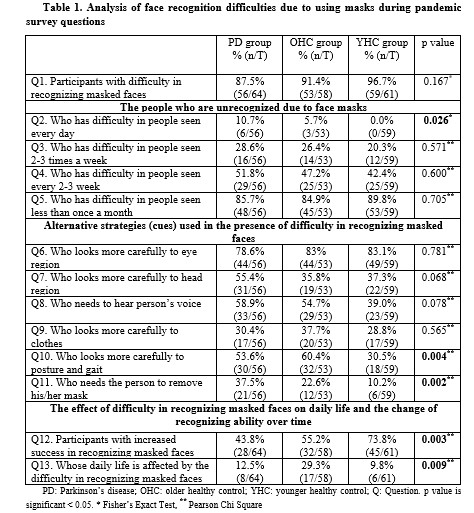Category: Parkinson's Disease: Cognitive functions
Objective: This study aims to evaluate the effect of using masks on face recognition ability in Patients with Parkinson’s disease (PwP).
Background: Patients with Parkinson’s disease (PwP) suffer from a range of non-motor symptoms such as affective and cognitive disorders, and in the visual perception domain, as well. Among these visual perception difficulties, face recognition problems were reported frequently. Widespread use of masks during COVID-19 pandemic gives a novel opportunity to investigate face recognition disturbances in PwP.
Method: Three groups were included; 64 PwP (Mini-Mental State Examination (MMSE)>24), 58 age and education-matched older healthy controls (OHC) (MMSE>24), and 61 younger healthy controls (YHC), aged 30-35. Benton Face Recognition Test-short form (BFRT-sf), and our close-ended “Face recognition difficulties due to using masks during pandemic” survey were applied to all groups.
Results: Comparing the BFRT-sf scores of the groups, while no statistically significant difference was found between PwP vs OHC groups, the difference between PwP vs YHC and OHC vs YHC groups were statistically significant (respectively; p=1.000, p<0.001, p<0.001). In the survey data; number of cases “who had difficulty in recognizing the people who are seen every day”, “who looked at the posture and gait as a cue when the masked face could not be recognized” and “who asked the people to remove their masks” were higher in PwP and OHC than YHC group (respectively; p=0.026, p=0.004, p=0.002). Besides, number of cases “whose difficulty in recognizing masked faces decreased compared to the beginning of pandemic” was higher in YHC than the others (p=0.003) and number of cases “who stated that the difficulty of recognizing masked faces affected on their daily lives” was higher in OHC than YHC and PwP groups (p=0.009) (Table 1).
Conclusion: Previous studies evaluating the face recognition ability of PwP and elderly people show that they usually have difficulties in tasks using holistic processing not piecemeal processing. Wearing a face mask presents a task where holistic processing cannot be used, and piecemeal processing is useful. In contradiction with previous records, the detection of some differences between groups in the responses to our survey may indicate that participants older than 50 display worse piecemeal processing performance than younger participants when using in daily life.
To cite this abstract in AMA style:
S. Tezcan Aydemir, M. Kuzu Kumcu, N. Durmaz çelik, B. Bakirarar, S. özkan, M. Akbostancı. THE ABILITY OF PATIENTS WITH PARKINSON’S DISEASE TO RECOGNIZE MASKED FACES DURING COVID-19 PANDEMIC [abstract]. Mov Disord. 2021; 36 (suppl 1). https://www.mdsabstracts.org/abstract/the-ability-of-patients-with-parkinsons-disease-to-recognize-masked-faces-during-covid-19-pandemic/. Accessed April 3, 2025.« Back to MDS Virtual Congress 2021
MDS Abstracts - https://www.mdsabstracts.org/abstract/the-ability-of-patients-with-parkinsons-disease-to-recognize-masked-faces-during-covid-19-pandemic/

